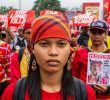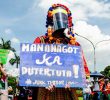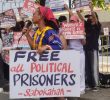Repression and violence
The passage of the wage increase bill by the House can also be seen as a political move by the administration-dominated chamber, given that President Macapagal-Arroyo�s political allies led by Speaker Jose de Venecia suffered a monumental setback in their unilateral move to revise the 1987 Constitution. The charter-change (cha-cha) has been popularly perceived as being politically-motivated and its aim was to perpetuate Macapagal-Arroyo and administration allies in Congress in power.
The workers� gain in their campaign for a legislated wage increase came at the price of trade union repression which took many forms � not the least of which was outright physical violence against a number of labor leaders.
The passage of the P125 wage hike bill at the House came less than a fortnight after the killing of Jesus Servida, a union leader at the EMI-Yazaki factory in Cavite, south of Manila.
When Karapatan (Alliance for the Advancement of People�s Rights) presented its 2006 Human Rights Report last Dec. 1, it listed 797 victims of extrajudicial killings from 2001 � when President Gloria Macapagal-Arroyo was catapulted to power through a popular uprising � to November 2006. Of these, 185 were killed from January to November 2006.
In terms of the number of victims, the top three sectors for January-November 2006 were the peasantry, the labor sector, and the professionals. Of the 185 documented victims for the said period, 104 were peasants, 28 were workers and 20 were professionals (mostly lawyers and teachers).
Servida is the 29th worker killed this year alone and the 74th worker to be slain under the Arroyo administration, based on combined data from Karapatan and the Center for Trade Union and Human Rights (CTUHR). Karapatan and the CTUHR have also recorded four cases of torture of workers from January to November 2006. Likewise, the two groups documented eight violent dispersals of rallies involving workers and trade unionists for the same period � a jump from one last year.
The repression against the Philippine labor sector this year has also taken forms less than physical but nevertheless equally damaging.
Arroyo�s declaration of a �State of Emergency� on February 24 this year, on the basis of a purported Left-Right conspiracy to overthrow the present administration, took its toll on the labor movement, with Beltran being arrested the very next day after its declaration. With Beltran�s arrest and subsequent detention, the labor movement saw the legislative work of one of its staunchest advocates being derailed.
In several areas in the country, mere membership in the KMU made workers targets for harassment. Several workers� groups particularly in Central Luzon and in Mindanao reported being harassed by military and police. They reported about their leaders being stopped and interrogated for long hours by soldiers and policemen, and of being told that their �troubles� would stop only if they disaffiliated from the KMU. Karapatan and CTUHR data showed cases of intimidation and surveillance against workers and trade unionists to have increased by almost 73 percent from last year.
Still, a ray of light
With all that the Philippine labor sector experienced in 2006, there almost seems to be no room for bright thoughts. Filipino workers seemed to have been losing an uphill battle this year.
Still, there is a ray of light. The gain that workers achieved in the push for better wages, while still partial, is nevertheless significant. The passage of the P125 wage hike bill at the House meant one less hurdle to overcome in the wage fight � and a foreshadowing of what may be achieved through determined efforts amid the odds. Bulatlat
[tags]davao today, philippines, labor, human rights, political killings, wages [/tags]
2006: Davao Today's Year-End Series









